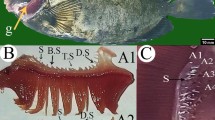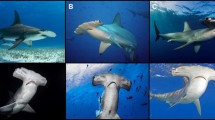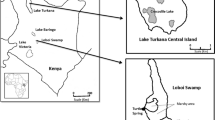Abstract
The main objective of this study was to compare the morphological variability of sea lamprey (Petromyzon marinus L.) larvae from the main Portuguese river basins. Samples were collected in rivers Minho, Lima, Cávado, Vouga, Mondego, Tejo and Guadiana. Specimens were analysed in terms of morphometric (linear body measures) and meristic (number of myomeres) characters to investigate the hypothesis of population fragmentation between river basins caused by some degree of homing behaviour. The discriminant analysis showed a morphological segregation of the studied populations based on the characters head, tail and branchial length. The discriminatory power of the meristic characters was comparatively weaker, with the number of trunk myomeres, and to some extent the head myomeres, being responsible for the reduced separation between groups. Both analyses were consistent in identifying the cephalic region as the most important morphological feature to discriminate populations of sea lamprey larvae in the Portuguese territory. The largest cephalic region of the ammocoetes sampled in the northern river basins may be responsible for a better feeding efficiency and, consequently, higher values of condition factor.




Similar content being viewed by others
References
Almeida, P. R. & B. R. Quintella, 2002. Larval habitat of the sea lamprey (Petromyzon marinus) in the river Mondego (Portugal). In Collares-Pereira, M. J., M. M. Coelho & I. G. Cowx (eds), Freshwater Fish Conservation: Options for the Future. Fishing News Books, Blackwell Science, Oxford: 121–130.
Almeida, P. R., H. T. Silva & B. R. Quintella, 2002. The spawning migration of the sea lamprey (Petromyzon marinus L.), in the River Mondego (Portugal). In Pardal, M. A., J. C. Marques & M. A. Graça (eds), Aquatic Ecology of the Mondego River Basin. Global Importance of Local Experience. Imprensa da Universidade de Coimbra, Coimbra: 381–386.
Barlow, G. W., 1961. Causes and significance of morphological variation in fishes. Systematic Zoology 10: 105–117.
Beamish, F. W. H., 1980. Biology of the North American anadromous sea lamprey, Petromyzon marinus. Canadian Journal of Fisheries and Aquatic Sciences 37: 1924–1943.
Beamish, F. W. H. & T. E. Medland, 1988. Age determination for lampreys. Transactions of the American Fisheries Society 117: 63–71.
Bergstedt, R. A. & J. G. Seelye, 1995. Evidence for lack of homing by sea lampreys. Transactions of the American Fisheries Society 124: 235–239.
Bird, D. J., I. C. Potter, M. W. Hardisty & B. I. Baker, 1993. Morphology, body size and behaviour of recently-metamorphosed sea lampreys, Petromyzon marinus, from the lower River Severn, and their relevance to the onset of parasitic feeding. Journal of Fish Biology 44: 67–74.
Bjerselius, R., W. Li, J. H. Teeter, J. G. Seelye, P. B. Johnsen, P. J. Maniak, G. C. Grant, C. N. Polkinghorne & P. W. Sorensen, 2000. Direct behavioral evidence that unique bile acids released by larval sea lamprey (Petromyzon marinus) function as a migratory pheromone. Canadian Journal of Fisheries and Aquatic Sciences 57: 557–569.
Claytor, R. R. & H. R. MacCrimmon, 1987. Partitioning size from morphometric data: a comparison of five statistical procedures used in fisheries stock identification research. Canadian Technical Report of Fisheries and Aquatic Services 1531: 1–23.
Claytor, R. R., H. R. MacCrimmon & B. Gots, 1991. Continental and ecological variance components of European and North American Atlantic salmon (Salmo salar) phenotypes. Biological Journal of the Linnean Society 44: 203–229.
Costa, J. L., P. R. Almeida & M. J. Costa, 2003. A morphometric and meristic investigation of Lusitanian toadfish Halobatrachus didactylus (Bloch & Schneider, 1801): evidence of population fragmentation on Portuguese coast. Scientia Marina 67: 219–231.
Griffiths, R. W., F. W. H. Beamish, B. J. Morrison & L. A. Barker, 2001. Factors affecting larval sea lamprey growth and length at metamorphosis in lampricide-treated streams. Transactions of the American Fisheries Society 130: 289–306.
Hair, J. F., R. E. Anderson, R. L. Tatham & W. C. Black, 1998. Multivariate Data Analysis, 5th ed. Prentice Hall, Upper Saddle River, USA.
Hardisty, M. W., 1986. Petromyzon marinus Linnaeus, 1758. In Holčik, J. (ed.), The Freshwater Fishes of Europe – Petromyzontiformes, Vol. 1. Part 1. Aula-Verlag, Wiesbaden, 94–116.
Hardisty, M. W. & I. C. Potter, 1971a. The behaviour, ecology and growth of larval lampreys. In Hardisty, M. W. & I. C. Potter (eds), The Biology of Lampreys, Vol. 1. Academic Press, London: 85–126.
Hardisty, M. W. & I. C. Potter, 1971b. The general biology of adult lampreys. In Hardisty, M. W. & I. C. Potter (eds), The Biology of Lampreys, Vol. 1. Academic Press, London: 127–206.
Holčik, J., 1986. Determination criteria. In Holčik, J. (ed.), The Freshwater Fishes of Europe – Petromyzontiformes, Vol. 1. Part 1. Aulag-Verlag, Wiesbaden: 24–28.
Ihssen, P. E., H. E. Booke, J. M. Casselman, J. M. McGlade, N. R. Payne & F. M. Utter, 1981. Stock identification: materials and methods. Canadian Journal of Fisheries and Aquatic Sciences 38: 1838–1855.
Jacobson, L. D., R. L. Torblaa & R. H. Morman, 1984. Problems with samples of sea lamprey (Petromyzon marinus) ammocoetes used in stock identification studies. Canadian Journal of Fisheries and Aquatic Sciences 41: 1421–1427.
Li, W., A. P. Scott, M. J. Siefkes, H. Yan, Q. Liu, S. Yun & D. Gage, 2002. Bile acid secreted by male sea lamprey that acts as a sex pheromone. Science 296: 138–141.
Li, W., P. W. Sorensen & D. D. Gallaher, 1995. The olfactory system of migratory adult sea lamprey (Petromyzon marinus) is specifically and acutely sensitive to unique bile acids released by conspecific larvae. Journal of General Physiology 105: 569–587.
Manion, P. J. & A. L. McLain, 1971. Biology of larval sea lampreys (Petromyzon marinus) of the 1960 year class, isolated in the Big Garlic River, Michigan, 1960–65. Great Lakes Fisheries Commission Technical Report 16: 1–35.
Manion, P. J. & T. M. Stauffer, 1970. Metamorphosis of the landlocked sea lamprey, Petromyzon marinus. Journal of the Fisheries Research Board of Canada 27: 1735–1746.
Melvin, G. D., M. J. Dadswell & A. McKenzie, 1992. Usefulness of meristic and morphometric characters in discriminating populations of American shad (Alosa sapidissima) (Ostreichthyes:Cluoeidae) inhabiting a marine environment. Canadian Journal of Fisheries and Aquatic Sciences 49: 266–280.
Morman, R. H., 1987. Relationship of density to growth and metamorphosis of caged larval sea lampreys, Petromyzon marinus Linnaeus, in Michigan streams. Journal of Fish Biology 30: 173–181.
Polkinghorne, C. N., J. M. Olson, D. G. Gallaher & P. W. Sorensen, 2001. Larval sea lamprey release two unique bile acids to the water at a rate sufficient to produce detectable riverine pheromone plumes. Fish Physiology and Biochemistry 24: 15–30.
Potter, I. C., 1980. The Petromyzoniformes with particular reference to paired species. Canadian Journal of Fisheries and Aquatic Sciences 37: 1595–1615.
Purvis, H. A., 1980. Effects of temperature on metamorphosis and the age and length at metamorphosis in sea lamprey (Petromyzon marinus) in the great lakes. Canadian Journal of Fisheries and Aquatic Sciences 37: 1827–1834.
Quintella, B. R., N. O. Andrade & P. R. Almeida, 2003. Distribution, larval stage duration and growth of the sea lamprey ammocoetes, Petromyzon marinus L., in a highly modified river basin. Ecology of Freshwater Fish 12: 286–293.
Reist, J. D., 1986. An empirical evaluation of coefficients used in residual and allometric adjustment of size covariation. Canadian Journal of Zoology 64: 1363–1368.
Ricker, W. E., 1975. Computation and interpretation of biological statistics of fish populations. Bulletin of the Fisheries Research Board of Canada 191: 1–382.
Rodríguez-Muñoz, R., J. R. Waldman, C. Grunwald, N. K. Roy & I. Wirgin, 2004. Mitochondrial DNA variation in sea lamprey between North American and Spanish rivers. Journal of Fish Biology 64: 783–787.
Rogado, L. (coord.), P. Alexandrino, P. R. Almeida, J. Alves, J. Bochechas, R. Cortes, I. Domingos, F. Filipe, J. Madeira & F. Magalhães, 2005. Petromyzon marinus Lampreia-marinha. In M. J. Cabral et al., Livro vermelho dos Vertebrados de Portugal Instituto de Conservação da Natureza, Lisboa, 65–66.
Rohlf, F. J. & D. E. Slice, 1995. Biomstat for Windows. Statistical Software for Biologists. Version 3.0. Exeter Software, New York.
Schaefer, K. M., 1991. Geographic variation in morphometric characters and gill-raker counts of Yellowfin Tuna, Thunnus albacares, from the Pacific Ocean. Fishery Bulletin 89: 289–297.
Sharp, J. C., K. A. Able, W. C. Leggett & J. E. Carscadden, 1978. Utility of meristic and morphometric characters for identification of capelin (Mallotus villosus) stocks in Canadian Atlantic waters. Journal of the Fisheries Research Board of Canada 35: 124–130.
SNIRH, 2004. Sistema Nacional de Informação de Recursos Hídricos. INAG, MAOTDR. Available: http://snirh.inag.pt (January 2006).
Sokal, R. R., & F. J. Rohlf, 1995. Biometry: The Principles and Practice of Statistics in Biological Research, 2nd ed. W.H. Freeman and Company, New York.
Tåning, A. V., 1952. Experimental study of meristic characters in fishes. Biological Reviews of the Cambridge Philosophical Society 27: 169–193.
Thorpe, R. S., 1976. Biometric analysis of geographic variation and racial affinities. Biological Reviews of the Cambridge Philosophical Society 51: 407–452.
Young, R. J., J. R. M. Kelso & J. G. Weise, 1990. Occurrence, relative abundance, and size of landlocked sea lamprey (Petromyzon marinus) ammocoetes in relation to stream characteristics in the Great Lakes. Canadian Journal of Fisheries and Aquatic Sciences 47: 1773–1778.
Youson, J. H., 1980. Morphology and physiology of lamprey metamorphosis. Canadian Journal of Fisheries and Aquatic Sciences 37: 1687–1710.
Youson, J. H., J. A. Holmes, J. A. Guchardi, J. G. Seelye, R. E. Beaver, J. E. Gersmehl, S. A. Sower & F. W. H. Beamish, 1993. The importance of condition factor and the influence of water temperature and photoperiod on metamorphosis of sea lampreys, Petromyzon marinus. Canadian Journal of Fisheries and Aquatic Sciences 50: 2448–2456.
Youson, J. H., J. Lee & I. C. Potter, 1979. The distribution of fat in larval, metamorphosing, and young adult anadromous sea lampreys, Petromyzon marinus. Canadian Journal of Zoology 57:237–246.
Youson, J. H. & I. C. Potter, 1979. A description of the stages of metamorphosis in the anadromous sea lamprey, Petromyzon marinus L. Canadian Journal of Zoology 57: 1808–1817.
Acknowledgements
The authors especially thank J. L. Costa for advice and assistance with the statistical analysis. This research was financially supported by two Portuguese institutions, the Water Institute (INAG) of the Ministry of Environment and by the Foundation for Science and Technology (FCT) with Project funding (PNAT/1999/BIA/15019/P) and a Ph.D. grant to B. R. Quintella (SFRH/BD/9125/2002).
Author information
Authors and Affiliations
Corresponding author
Additional information
Guest editors: S. Dufour, E. Prévost, E. Rochard & P. Williot
Fish and diadromy in Europe (ecology, management, conservation)
Rights and permissions
About this article
Cite this article
Almeida, P.R., Tomaz, G., Andrade, N.O. et al. Morphological analysis of geographic variation of sea lamprey ammocoetes in Portuguese river basins. Hydrobiologia 602, 47–59 (2008). https://doi.org/10.1007/s10750-008-9285-4
Published:
Issue Date:
DOI: https://doi.org/10.1007/s10750-008-9285-4




